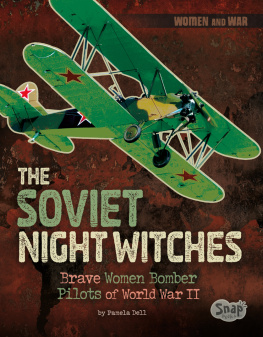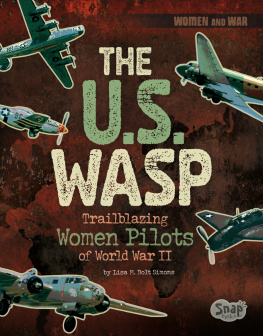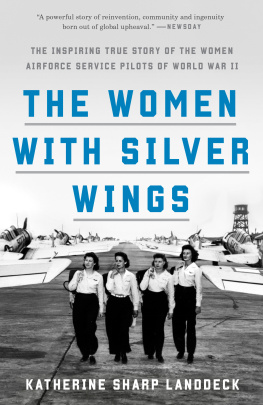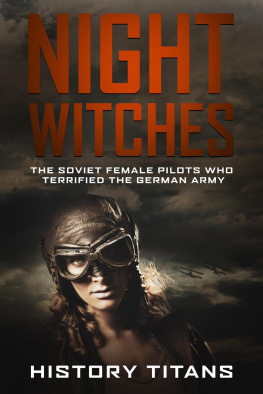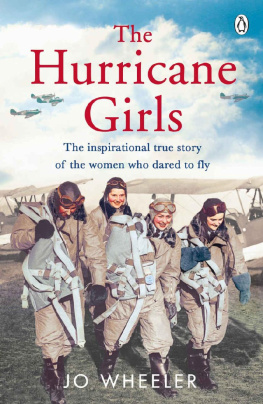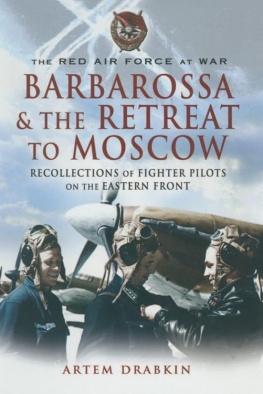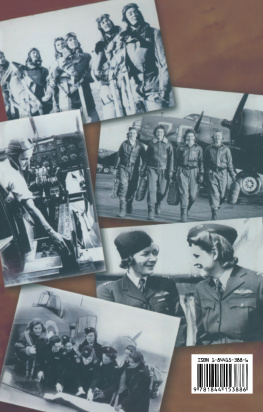Myles - Night Witches: The Amazing Story of Russias Women Pilots in WWII
Here you can read online Myles - Night Witches: The Amazing Story of Russias Women Pilots in WWII full text of the book (entire story) in english for free. Download pdf and epub, get meaning, cover and reviews about this ebook. year: 1990, publisher: Academy Chicago Publishers, genre: Non-fiction. Description of the work, (preface) as well as reviews are available. Best literature library LitArk.com created for fans of good reading and offers a wide selection of genres:
Romance novel
Science fiction
Adventure
Detective
Science
History
Home and family
Prose
Art
Politics
Computer
Non-fiction
Religion
Business
Children
Humor
Choose a favorite category and find really read worthwhile books. Enjoy immersion in the world of imagination, feel the emotions of the characters or learn something new for yourself, make an fascinating discovery.

- Book:Night Witches: The Amazing Story of Russias Women Pilots in WWII
- Author:
- Publisher:Academy Chicago Publishers
- Genre:
- Year:1990
- Rating:3 / 5
- Favourites:Add to favourites
- Your mark:
- 60
- 1
- 2
- 3
- 4
- 5
Night Witches: The Amazing Story of Russias Women Pilots in WWII: summary, description and annotation
We offer to read an annotation, description, summary or preface (depends on what the author of the book "Night Witches: The Amazing Story of Russias Women Pilots in WWII" wrote himself). If you haven't found the necessary information about the book — write in the comments, we will try to find it.
Myles: author's other books
Who wrote Night Witches: The Amazing Story of Russias Women Pilots in WWII? Find out the surname, the name of the author of the book and a list of all author's works by series.
Night Witches: The Amazing Story of Russias Women Pilots in WWII — read online for free the complete book (whole text) full work
Below is the text of the book, divided by pages. System saving the place of the last page read, allows you to conveniently read the book "Night Witches: The Amazing Story of Russias Women Pilots in WWII" online for free, without having to search again every time where you left off. Put a bookmark, and you can go to the page where you finished reading at any time.
Font size:
Interval:
Bookmark:
I stumbled on the idea for this book quite by accident. While doing research on the air war on the Eastern Front, one of my first pieces of background reading was the official history of the Soviet Air Force in World War II. There, tucked away and dismissed in a few paragraphs was the revelation that the Red Air Force, for the first time in recent history, had used women in combat. Not merely one or two, but entire air regiments. It was clear, even from the brief references, that these young women had fought in the fiercest air battles and had received their country's highest decorations for bravery. Here, I realized, was a unique story - an exciting true-life adventure which had somehow been ignored by the military historians. As my research progressed, I felt that a book based on these experiences could become one of the great untold sagas of the war - and a startling example of equality of the sexes preceding the equal rights amendment by forty years.
Investigating further, I found references to the women fliers in esoteric, limited circulation reference books written by Luftwaffe field commanders on the Russian Front. The Soviet Embassy in London and the Novosti Press in Moscow, through veterans' association, tracked down for me from twenty to thirty survivors. I made a series of trips to the Soviet Union and taped, mainly through an interpreter, many hours of interviews with these women, both in groups and singly, making cross-references between accounts to satisfy myself of their authenticity. I also had access to their regimental history books, and books that some of the women themselves had written but which had never been published outside their own country.
The more I talked to these women, the more human interest and drama I uncovered. As a reporter of twenty years' wide experience, I knew I had never been involved in such an exciting story. Every word was true, yet it seemed the very stuff of romantic thrillers. I had done enough flying to understand and appreciate the courage and spirit of these young women, scarcely beyond their teens, fighting the invader in the skies over their homeland. Their story demanded to be told and became this book, Night Witches.
Bruce Myles
December 1980
It was 9.30 on the evening of Saturday, 21 June, 1941. Nadia Popova cupped the little tortoiseshell mirror in the palm of her hand and tilted it slightly to the left and then upward a little. The light was not bright where she sat, so she could admire herself from time to time with all the unselfconscious approval of any pretty seventeen-year-old. The jazz band on stage was playing an American song 'Down Mexico Way'. Nadia sang along in English with the words of the title, which was more than most people in Donetsk could do.
The dance floor was a swirl of colour and movement. Girls in short-sleeved cotton dresses giggled as they teetered around the floor on their unaccustomed high heels. Red-faced partners in shirt sleeves held them clumsily at arm's length. Several called out to Nadia as they swept past. The doors of the wooden building were open. It had been a very hot day, and the sound of the music rose and fell as it carried through the heavy warmth of the late evening. Now and then, the disembodied notes of a tune would eddy briefly as far as the cornfields which stretched beyond the town into the gathering darkness.
It was after midnight when the dance broke up. Nadia planted a brief kiss on the damp forehead of one of the boys who had walked home with her and said goodnight. Then she slipped off her shoes and splayed her toes as the short, damp grass of the garden brushed deliciously against her bare feet. She leaned against a cherry tree and closed her eyes. No school tomorrow, so it was a long lie in bed, then down to the flying club after lunch.
It was growing cold. She pulled her shawl around her shoulders and walked into the house. Her mind kept coming back to the only serious moment of the evening, when one of the boys had talked about the possibility of war with Germany. She had said quite firmly that it was impossible - there was a non-aggression pact, was there not? War was unthinkable. She was young, pretty, and popular. She had her flying, her family, and her friends. It must never end. She got out of bed, pulled a shawl around her shoulders and silently stole outside again. In the east, the sky was definitely becoming light.
At noon the next day, Nadia was ironing a dress for that evening's dance. Frequently she would stop and place the iron on the hearth to reheat. Her mother sang softy to herself as she stood in the kitchen, cutting up chicken. Leonid, her brother, had gone off to visit his fiance. Nadia's father switched on the radio, which sat on the lace-covered table near the open window. It took some time to warm up, then came the familiar tones of the Radio Moscow announcer Yuri Livitan: 'There will now be a broadcast by Foreign Minister Comrade Molotov. This is an important announcement.'
Nadia Popova told me, 'I told my mother to come quickly to hear the announcement. I felt a weakness in my stomach and a throbbing in my temples. I feared that he would say the words I was dreading. But of course he did.'
Molotov spoke. 'At four o'clock this morning, without declaration of war and without any claims being made on the Soviet Union, German troops attacked our frontier in many places and bombed from the air Zhitomir, Kiev, Sebastopol, and Kaunus. This unheard of attack on our country is an unparalleled act of perfidy in the history of civilized nations.' Her father stood up and put his arm around her mother. They looked at each other in silence.
A wisp of blue smoke rose from the table where the iron was smouldering through the blue cotton dress. Nadia was running. She felt the wind in her face. She was running towards the airfield.
At 3.15 A.M. on 22 June, 1941, as Nadia Popova lay awake in her room, the artillery barrage opened up all along the front from the Baltic to the Black Sea. German bombers swept low over Soviet frontier airfields and destroyed squadron after squadron of closely parked fighters and bombers as their crews lay in their billets. Operation Barbarossa, Hitler's attack on the Soviet Union, had begun.
Adolf Hitler planned to crush the Soviet Union in a lightning ten-week summer campaign. Panic, confusion, and ignorance reigned on the Soviet side of the frontier. The air strikes had given the Germans almost complete air superiority, and Soviet ground units were paralysed through lack of communication. In Moscow, the Politburo clung to the hope that they might persuade Hitler to call off his attack; they ordered their troops to keep out of Germany and instructed Soviet aircraft not to penetrate enemy territory any deeper than ninety miles.
On 14 June, just eight days before the attack, a broadcast from the Kremlin had described the rumours of a German attack on the Soviet Union as 'an obvious absurdity'. But on the same day, Hitler had travelled from his retreat at Berchtesgarden in the Bavarian Alps to the Reichschancellery in Berlin for an all-day meeting with the commanders in chief and top field generals of the three armed services. It was to be his final war conference for Operation Barbarossa.
One of the most serious blows to the Russians was the destruction of enormous numbers of aircraft on the ground - some of them the latest Soviet fighter designs which had not even had their camouflage paint applied. The official Soviet History of the War grimly recounts the crass planning that made the German pre-emptive strikes so successful. The fast new aircraft needed longer runways, so a network of new airfields was built in the frontier zones in the summer of 1941. The History says:
As a result our fighter aircraft were concentrated, on 22 June, on a very limited number of airfields, which prevented their proper camouflage, manoeuvrability and dispersal. Also, some of the new airfields had been built much too close to the frontier, which made them specially vulnerable in the event of a surprise attack. The absence of a proper network of airfields on 22 June and the overcrowding of a small number of the older airfields -the location of which was perfectly well known to the enemy -account for the very grave losses our air force suffered during the very first days of the war.
Font size:
Interval:
Bookmark:
Similar books «Night Witches: The Amazing Story of Russias Women Pilots in WWII»
Look at similar books to Night Witches: The Amazing Story of Russias Women Pilots in WWII. We have selected literature similar in name and meaning in the hope of providing readers with more options to find new, interesting, not yet read works.
Discussion, reviews of the book Night Witches: The Amazing Story of Russias Women Pilots in WWII and just readers' own opinions. Leave your comments, write what you think about the work, its meaning or the main characters. Specify what exactly you liked and what you didn't like, and why you think so.


